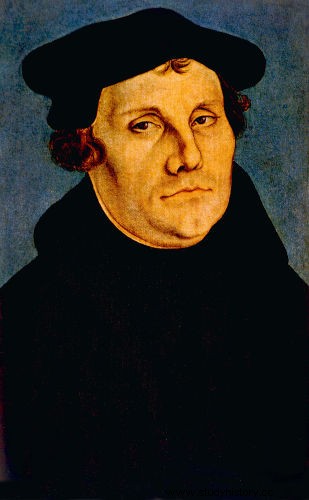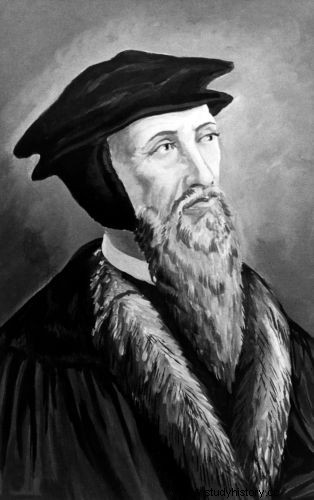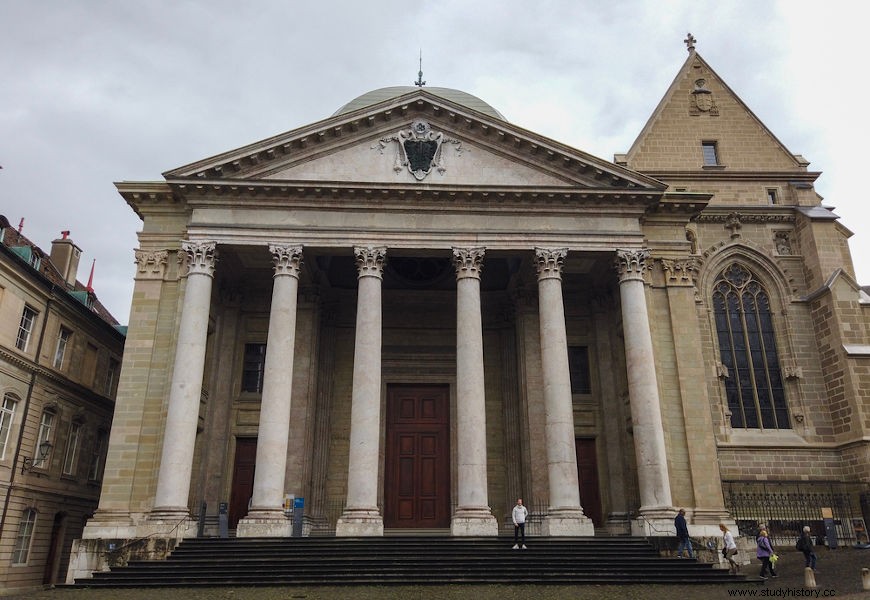Calvinism was a religious doctrine that emerged during the Protestant Reformation. Historians understand that this doctrine emerged in a second wave of reformers, and the person responsible for its establishment was the Frenchman John Calvin. Calvinism took advantage of religious tolerance to establish itself in Switzerland, and from there spread across Europe.
Calvinism began to emerge when John Calvin became a Protestant, in 1530s. After moving to Switzerland, he began work as a preacher, causing Calvinist doctrine to become mainstream in Geneva. The cornerstone of Calvinism is the belief in predestination, that is, the idea that God has chosen who will be saved and who will be damned.
Login also :John Wyclif and Jan Hus - Two forerunners of Luther in Europe
Context

Calvinism is understood by many historians as a movement that was part of a second wave of religious reformism . The Protestant Reformation began with the action of Martin Luther when questioning some of the dogmas of the Catholic Church, especially on the issue of indulgences , a practice that consisted of donating money in search of forgiveness and guarantee of salvation.
Luther's contestation was not intended to generate a break with the Catholic Church, but to enable its reform. He wanted actions seen as immoral, such as the collection of indulgences and simony (selling ecclesiastical offices), to be expelled from the religious milieu. However, Luther was excommunicated , causing its definitive break with the Holy See.
Luther still sought to ensure people's access to the sacraments , since he believed that there was no need for priests to make the dialogue of the faithful with God. How he believed in the idea that salvation was guaranteed by faith , it was vital that people have direct contact with the Holy Scriptures.
So salvation was an experience individual which should be obtained by strengthening people's faith. To make this possible, Luther translated the Bible into German and composed hymns in that language too so that people could sing during the celebrations.
Luther's ideas spread to many parts of Europe and, in some places, found a favorable scenario to propagate. However, this action set a precedent, for if everyone could read the Bible, different interpretations could emerge from this contact. This started the aforementioned second wave of reformism in Europe.
Reform in Switzerland
At the end of the 15th century, Switzerland secured its independence from the Holy Roman Empire, becoming a region with a very thriving trade. This Swiss bourgeoisie became open to the ideas of Protestantism , mainly because Protestantism ended the ties created by the Catholic Church in the matter of usury practiced by merchants.
The first prominent reformer to emerge in Switzerland was Ulrich Zwingli , a theologian who espoused ideas similar to those of Luther, such as the belief that faith alone, and not good works, was able to guarantee salvation. Zwingli, like Luther, defended the right of the faithful to have access to the Bible and that the Scriptures should have more importance than the priest.
Zwingli said that the Bible did not say anything about Lent, therefore, the act of fasting during this period was irrelevant. He still questioned the celibacy of priests and claimed that forgiveness for sins was an action that only God could do and not a priest. The Swiss reformer preached against images and the use of music in celebrations.
Zwingli had many similarities with the Lutherans, as we have seen so far, but on one point he differed from them:the Eucharist . Zwingli did not believe in the idea of transubstantiation of the elements of the Holy Supper, therefore, for him, the wine and the bread were only symbols and not in fact the Body and Blood of Christ, as Catholics and Lutherans believed.
The popularization of Zwingli's ideas reached local politics and he encouraged the Zurich City Council, where he resided, to overthrow the Catholic Church and take control of the city's ecclesiastical affairs. The rise of Zwingli reformism took place in the 1520s and resulted in a civil war between Catholics and Protestants , between 1529 and 1531.
Zwingli participated in the fighting of this war against the Catholics and died in combat, in 1531. The Protestants achieved a great achievement after this conflict:the Peace of Kappel . This agreement ensured that tolerance would be established religious in Switzerland, and this allowed Protestantism to establish itself permanently in that country. The reformer John Calvin emerged in this context of tolerance.
Emergence of Calvinism

John Calvin was born in Noyon, France, in 1509 and became a master of theology when he was just 18 years old. In 1532 Calvin graduated in law, much at his father's insistence; intellectually, he had a great interest in humanism , and thus devoted himself to the study of things by returning to the original sources.
Between 1533 and 1534, John Calvin converted to Protestantism . He kept close contact with Luther's ideas, but attributed his conversion to divine providence. Still in 1534, Calvin publicly acknowledged his conversion to Protestantism. However, in France, there was no religious tolerance, and, fearing persecution, he decided to escape to Geneva , Switzerland, in 1536.
In Switzerland, the existence of religious tolerance allowed Calvin to practice his ideas freely. In Geneva he was convinced by a local preacher named William Farel, to join efforts to spread the Reformed faith throughout the city. However, disagreements with the Geneva local administration led to him being expelled from the city in 1538, but three years later he was again invited to bring the Reformed faith to the Swiss city.
In Geneva, Calvin had a great influence on the reorganization of the local congregation and also on politics. Theologically, the reform promoted by Calvin had as its central point the idea of predestination . This concept says that God, before creation, had already determined those who would be saved and those who would be left to eternal damnation.
However, Calvin maintained that it was impossible to find out who were the elect to salvation, but that some evidence could indicate this. These signs were to be sought by the faithful while maintaining a righteous life in obedience to God. Within Calvinist theology, Christ's action in sacrificing himself was not an act to save all humanity, but only the elect .
Calvinism also saw faith in a more individualized way, and so the role of intermediary with God played by clergy in the Catholic Church was criticized by Calvin. He believed that each person should maintain their own relationship with God , maintaining a conduct of life marked by purity.
The appreciation of purity and a regulated life led Calvino to defend some extreme measures, such as the ban on dancing in Geneva. He also attempted to regulate quite rigidly the habits and customs of the faithful through a local institution that governed the city. The asceticism eventually established itself as an important practice of the Calvinist faith.
Calvin's ideas also made an extensive defense of the idea of vocation . In this sense, Calvin said that each person had received gifts and talents from God and that it was everyone's duty to exalt the glory of God, taking these talents to their maximum development. Thus, Calvinism created theological principles that resulted in a great valorization of work , because if practicing your vocation was to exalt God, then working exhaustively was an act of faith.
Calvin also fought the usury restrictions advocated by the Catholic Church. With that, the accumulation from riches it became something acceptable and sought after by Calvinists. In Calvinist logic, dedication to his vocation resulted in the accumulation of wealth, seen as a blessing from God to the work performed. Therefore, wealth came to be seen as a proof of God's blessings to those who exalted him through their vocation.
The ideas of Calvinism and its justification of work and the accumulation of wealth were well received in many parts of Europe, especially by the bourgeoisie. Many historians say that such ideas contributed to the development of capitalism . Calvinists spread to other locations such as England, Scotland, France and the Netherlands.
Login also :Thirty Years' War - motivated by rivalry between Catholics and Protestants
Five Points of Calvinism

Calvin's ideas became popular in Geneva, becoming known as Calvinism or faith renovated . His precepts were organized, in the following centuries, by the faithful themselves and can be summarized in five points:
- Total depravity of man :belief that man is evil and incapable of redeeming himself from his acts without a regeneration of the spirit that gives him a new nature. In this sense, the demonstration of faith is a clear manifestation of salvation.
- Unconditional Election :salvation took place through an act of predestination. Therefore, before creation, God chose those who would be saved.
- Atonement limited :the sacrifice performed by Jesus Christ was not intended to save humanity, but only the elect.
- Grace irresistible :the elect cannot resist the call made by God because God's grace is irresistible.
- Perseverance dos saints :all those chosen by God keep their faith and persevere to the end.
Image credits
[1] GennadiiM and Shutterstock
